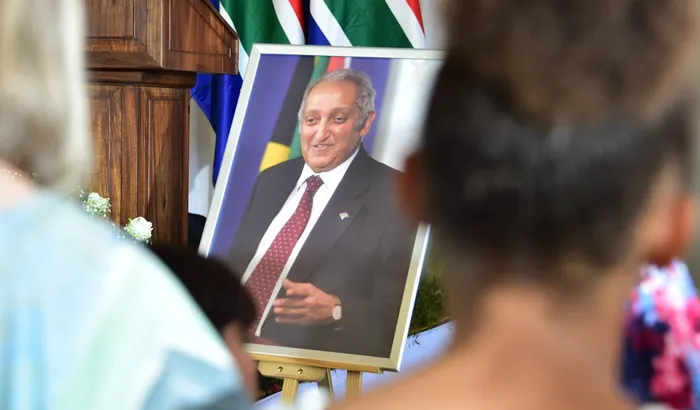South Africa: Aziz Pahad was a true diplomat

Picture: GCIS - Former deputy Foreign Affairs minister and ANC stalwart, Aziz Pahad's funeral took place at the Westpark Cemetery in Johannesburg on Saturday.
By David Monyae
The Centre of Africa-China Studies at the University of Johannesburg joins South Africa and the rest of the world in mourning the passing of Aziz Pahad, the former deputy minister of international relations and co-operation in South Africa.
Born in Schweizer-Reneke, Pahad was bred in a family of political giants who cut their teeth in the Indian Congress in South Africa, before broadening their political horizons to merge their efforts with the ANC and the SACP.
Aziz and his elder brother, Essop, were in exile from the 1960s to the unbanning of liberation movements in the early 1990s. It was during their decades of exile that the Pahad brothers came into their own, forging lifelong friendships and camaraderie with anti-apartheid stalwarts such as Thabo Mbeki, who succeeded Nelson Mandela as South Africa’s post-apartheid president in 1999.
Aziz Pahad was at the forefront of the anti-apartheid movement. He distinguished himself by championing the cause and formulae of the ANC, even at the time when the then exiled political party was closed to white and Indian membership in its highest decision-making echelons. Under the auspices of the ANC, he was educated at Sussex and received military training in the Soviet Union.
Pahad’s diplomatic talent was noted by the ANC, as demonstrated by his appointment as deputy minister of foreign affairs from 1994 to 2008, the longest period in this position.
The title of his autobiography, Insurgent Diplomat: Civil Talks of Civil War? (2014) captures Pahad’s life of progressive resolve, political militancy but also a readiness to engage in diplomacy when the time was auspicious. His brother, Essop, related that his brother was a witty interlocutor, with a quick repartee to enliven debate and break the ice with whoever he was engaging with. What further put Pahad as a capable diplomat, especially during the absorbing days leading to South Africa’s 1994 milestone, was his fluency in Afrikaans, the language of the apartheid edifice.
President Cyril Ramaphosa described Pahad as “a consummate diplomat not only in the service of our country but in support of causes for freedom and justice elsewhere in the world, notably advocating the plight of the Palestinian people”.
He was also noted for his open opposition to American threats to, and later the invasion of Iraq. He was a diplomat in the mould of all diplomats who always fought for global justice, and against unilateral use of force – as the US did in Iraq, with the servile support of the UK. It is this global activism that won Pahad friends, but also critics, the world over.
Apart from the dour engagements of diplomacy, Pahad was a full human, a party boy, as his long-time friend Terry Bell described him. Like his brother Essop, he was also an avid supporter of sport, with cricket and rugby being his games of choice. The Centre for Africa-China Studies worked closely with Pahad brothers. Essop served as the inaugural board chairperson of the Centre for Africa-China Studies while Aziz was an unofficial mentor to some of our staff members. In his life, South Africa enjoyed the gifts of a diplomatic genius. We wish his family the condolences that are due at such an inestimable loss.
*David Monyae is associate professor of international relations and political science and director of the Africa-China Studies Centre at the University of Johannesburg.